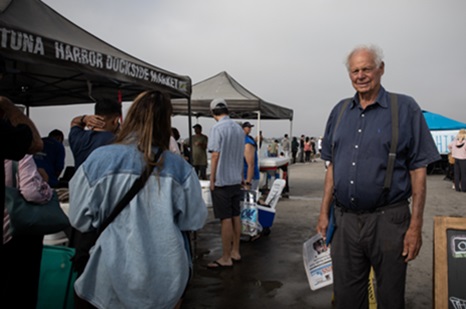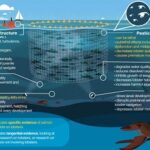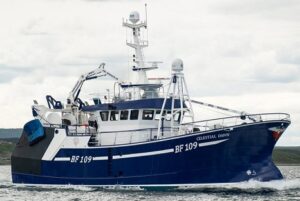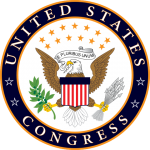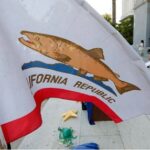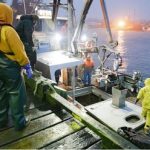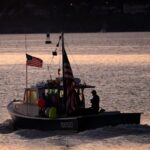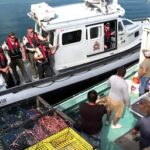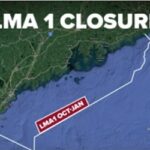Tag Archives: NOAA
Many Maine fishermen applaud Trump order calling for deregulation
 Many Maine fishermen are applauding a new executive order from President Trump, which calls on the federal government to identify and roll back regulations that are overly burdensome to the commercial fishing industry. The order signals that the Trump administration wants to listen to commercial harvesters and involve them in decision-making and research, said Ben Martens, executive director of the Maine Coast Fishermen’s Association. Jerry Leeman, CEO of the New England Fishermen’s Stewardship Association, described the order as a “long time coming.” Many of his members have long questioned the data that federal fisheries regulators use to conduct stock assessments and set stock limits. more, >>CLICK TO READ<< 14:07
Many Maine fishermen are applauding a new executive order from President Trump, which calls on the federal government to identify and roll back regulations that are overly burdensome to the commercial fishing industry. The order signals that the Trump administration wants to listen to commercial harvesters and involve them in decision-making and research, said Ben Martens, executive director of the Maine Coast Fishermen’s Association. Jerry Leeman, CEO of the New England Fishermen’s Stewardship Association, described the order as a “long time coming.” Many of his members have long questioned the data that federal fisheries regulators use to conduct stock assessments and set stock limits. more, >>CLICK TO READ<< 14:07
Fishermen Urge DOGE-Style Reforms Of ‘Leviathan Bureaucracy’ That Throttled Industry Growth
 The New England Fishermen’s Stewardship Association (NEFSA) sent the letter to DOGE Wednesday outlining the “unnecessary bloat” of federal regulations that are “destroying the fishing industry.” The group urged DOGE to begin the process of deregulating the industry by reallocating National Oceanic and Atmospheric Administration (NOAA) Fisheries’ funds currently used to “destroy” the industry by placing regulations that have benefitted “foreign competitors” to instead go to “supporting and marketing” the fishing industry. “Fishing is one of the most dangerous and challenging trades in existence, but it is an invaluable source of food and commerce,” the letter reads. “Overregulation by climate-focused, ideological bureaucrats is destroying the fishing industry, making it nearly impossible for working-class fishermen to make a living.” Links, more, >>CLICK TO READ<< 16:05
The New England Fishermen’s Stewardship Association (NEFSA) sent the letter to DOGE Wednesday outlining the “unnecessary bloat” of federal regulations that are “destroying the fishing industry.” The group urged DOGE to begin the process of deregulating the industry by reallocating National Oceanic and Atmospheric Administration (NOAA) Fisheries’ funds currently used to “destroy” the industry by placing regulations that have benefitted “foreign competitors” to instead go to “supporting and marketing” the fishing industry. “Fishing is one of the most dangerous and challenging trades in existence, but it is an invaluable source of food and commerce,” the letter reads. “Overregulation by climate-focused, ideological bureaucrats is destroying the fishing industry, making it nearly impossible for working-class fishermen to make a living.” Links, more, >>CLICK TO READ<< 16:05
Fishermen, scientists differ on whale mortality, wind energy
 At first glance, the stretch of coast near the Bennett Street beach access point in Kitty Hawk blends seamlessly with the rest of the coastline. It’s impossible to tell that, just a few months ago, this sand cradled the lifeless, 19,000-pound carcass of a humpback whale. North Carolina coastal communities are actively debating the cause of the increase in whale mortalities, with concerns surrounding political agendas at the heart of the discussion. Marine scientists have identified human interaction with ships as the leading cause of these whale mortalities, causing the National Oceanic and Atmospheric Administration to attempt tightening vessel speed restrictions. Fishermen have largely opposed stricter regulations, blaming numerous economic struggles on what they see as a mountain of NOAA rules. more, >>CLICK TO READ<< 07:50
At first glance, the stretch of coast near the Bennett Street beach access point in Kitty Hawk blends seamlessly with the rest of the coastline. It’s impossible to tell that, just a few months ago, this sand cradled the lifeless, 19,000-pound carcass of a humpback whale. North Carolina coastal communities are actively debating the cause of the increase in whale mortalities, with concerns surrounding political agendas at the heart of the discussion. Marine scientists have identified human interaction with ships as the leading cause of these whale mortalities, causing the National Oceanic and Atmospheric Administration to attempt tightening vessel speed restrictions. Fishermen have largely opposed stricter regulations, blaming numerous economic struggles on what they see as a mountain of NOAA rules. more, >>CLICK TO READ<< 07:50
Gulf of Maine scallop fishery likely to close for first time in over 15 years
 Fishermen are likely to be restricted from hauling scallops from federal waters in the Gulf of Maine for several weeks because regulators have delayed finalizing annual catch limits. The temporary closure, expected in the next five days, would mark the first time the National Oceanic and Atmospheric Administration has shut down the regional fishery midseason since the regulations were put into place 16 years ago. Those who dive for scallops near Maine’s coast are unaffected; federal waters begin 3 miles offshore. NOAA typically passes annual rules by April 1, when the federal scalloping season kicks off. But without them, there is a stopgap measure in place that permits a limited amount of fishing. That limit has almost been reached. more, >>CLICK TO READ<< 06:52
Fishermen are likely to be restricted from hauling scallops from federal waters in the Gulf of Maine for several weeks because regulators have delayed finalizing annual catch limits. The temporary closure, expected in the next five days, would mark the first time the National Oceanic and Atmospheric Administration has shut down the regional fishery midseason since the regulations were put into place 16 years ago. Those who dive for scallops near Maine’s coast are unaffected; federal waters begin 3 miles offshore. NOAA typically passes annual rules by April 1, when the federal scalloping season kicks off. But without them, there is a stopgap measure in place that permits a limited amount of fishing. That limit has almost been reached. more, >>CLICK TO READ<< 06:52
The offshore wind debate could influence this federal election and it’s already an ‘absolute blood-fest’

“Get out of our town, Albo!” the man yelled. “We don’t want your wind farms!”
The Illawarra, on the NSW south coast, can be hostile territory for Australian politicians. In 1939, Robert Menzies was booed by thousands of placard-waving locals as police escorted him down the Bulli Pass to meet striking waterside workers in Wollongong. Fast forward to 2025 and it was Anthony Albanese’s turn to feel the heat down near the steelworks. During a February press conference announcing his new candidate for Whitlam, he copped a gobful from a man dressed in a tan shirt and black shorts. “Get out of our town, Albo!” the man yelled. “We don’t want your wind farms!” That protester was financial adviser Alex O’Brien, who is not just another local resident. Mr. O’Brien is, in fact, president of a not-for-profit association called Responsible Future (Illawarra Chapter) or RFI, whose purpose is to tank Labor’s proposed offshore wind project in the Illawarra. more, >>CLICK TO READ<< 10:53
NOAA Hired an Anti-Wind Activist as Its Top Lawyer
 The National Oceanic and Atmospheric Administration has hired a new general counsel who was, until recently, pursuing legal challenges to offshore wind farms on behalf of the fishing industry, Heatmap has learned. NOAA’s Fisheries division, also known as the National Marine Fisheries Service, regulates species protection within U.S. waters. Activists have sought to persuade the Trump administration to review the division’s previous and future approvals for offshore wind projects that interact with endangered marine life, which would be a huge win for the “wind kills whales” movement. Enter Anne “Annie” Hawkins, NOAA’s new general counsel, who comes to the agency after serving for years as the executive director of the Responsible Offshore Development Alliance, an organization founded in 2017 that has fought offshore wind projects on behalf of the fishing industry. Hawkins stepped down as RODA’s executive director last fall, shortly after Trump won the presidential election. Links, more, >>CLICK TO READ<< 15:22
The National Oceanic and Atmospheric Administration has hired a new general counsel who was, until recently, pursuing legal challenges to offshore wind farms on behalf of the fishing industry, Heatmap has learned. NOAA’s Fisheries division, also known as the National Marine Fisheries Service, regulates species protection within U.S. waters. Activists have sought to persuade the Trump administration to review the division’s previous and future approvals for offshore wind projects that interact with endangered marine life, which would be a huge win for the “wind kills whales” movement. Enter Anne “Annie” Hawkins, NOAA’s new general counsel, who comes to the agency after serving for years as the executive director of the Responsible Offshore Development Alliance, an organization founded in 2017 that has fought offshore wind projects on behalf of the fishing industry. Hawkins stepped down as RODA’s executive director last fall, shortly after Trump won the presidential election. Links, more, >>CLICK TO READ<< 15:22
Hawaiʻi longline fishers experience ‘all-time low’ in profits
 Hawaiʻi’s longline fishers are facing record lows in profits, according to a recent report from the National Oceanic and Atmospheric Administration. For years, NOAA’s Pacific Islands Fisheries Science Center has collected data on fishing trip costs and earnings for Hawaiʻi’s commercial longline fishery and surveyed 60 fishers to get data for 2022. PIFSC found that the average fishing vessel made around $808,000 in gross revenue that year. Of that, 54% went to trip costs like fuel, ice and bait, and 22% went to labor. After other costs, boat owners took home an average of 5%. Adjusted for inflation, that’s an average of about $44,000 in profit. more, >>CLICK TO READ<< 07:51
Hawaiʻi’s longline fishers are facing record lows in profits, according to a recent report from the National Oceanic and Atmospheric Administration. For years, NOAA’s Pacific Islands Fisheries Science Center has collected data on fishing trip costs and earnings for Hawaiʻi’s commercial longline fishery and surveyed 60 fishers to get data for 2022. PIFSC found that the average fishing vessel made around $808,000 in gross revenue that year. Of that, 54% went to trip costs like fuel, ice and bait, and 22% went to labor. After other costs, boat owners took home an average of 5%. Adjusted for inflation, that’s an average of about $44,000 in profit. more, >>CLICK TO READ<< 07:51
Trump’s Regulatory Freeze Throws US Fishing Industry Into Chaos
 President Donald Trump’s regulatory freeze has injected chaos and uncertainty into a number of lucrative American fisheries, raising the risk of a delayed start to the fishing season for some East Coast cod and haddock fleets and leading to overfishing of Atlantic bluefin tuna, according to Reuters interviews with industry groups and federal government employees. America’s $320 billion fishing industry relies on a branch of the federal government, the National Oceanic and Atmospheric Administration, to manage coastal fisheries. Under a 1976 law, NOAA’s National Marine Fisheries Service develops management plans for 45 fisheries, setting quotas and determining the start and close of fishing seasons, in consultation with federal government scientists and local fishermen. more, >>CLICK TO READ<< 09:19
President Donald Trump’s regulatory freeze has injected chaos and uncertainty into a number of lucrative American fisheries, raising the risk of a delayed start to the fishing season for some East Coast cod and haddock fleets and leading to overfishing of Atlantic bluefin tuna, according to Reuters interviews with industry groups and federal government employees. America’s $320 billion fishing industry relies on a branch of the federal government, the National Oceanic and Atmospheric Administration, to manage coastal fisheries. Under a 1976 law, NOAA’s National Marine Fisheries Service develops management plans for 45 fisheries, setting quotas and determining the start and close of fishing seasons, in consultation with federal government scientists and local fishermen. more, >>CLICK TO READ<< 09:19
Fishermen could face stricter catch limits as Trump slashes NOAA
 On a recent Wednesday, many crews on New Bedford’s fishing piers were doing gear work for their next trip, as Eric Hansen repaired the cabinets in the galley of The Intrepid, one of his two scallop boats. People on the docks have known for weeks about the mass firing at the National Oceanic and Atmospheric Administration, but Hansen said most people don’t realize how it will affect them yet. “Some are welcoming the cuts, saying that the government has been their downfall and there’s too many regulations,” Hansen said. “And I don’t share that opinion.” Hansen, a former captain from a fishing family where five consecutive generations entered the industry, said that’s because he remembers when the scallop fishery hit rock bottom. Photos, more, >>CLICK TO READ<< 11:54
On a recent Wednesday, many crews on New Bedford’s fishing piers were doing gear work for their next trip, as Eric Hansen repaired the cabinets in the galley of The Intrepid, one of his two scallop boats. People on the docks have known for weeks about the mass firing at the National Oceanic and Atmospheric Administration, but Hansen said most people don’t realize how it will affect them yet. “Some are welcoming the cuts, saying that the government has been their downfall and there’s too many regulations,” Hansen said. “And I don’t share that opinion.” Hansen, a former captain from a fishing family where five consecutive generations entered the industry, said that’s because he remembers when the scallop fishery hit rock bottom. Photos, more, >>CLICK TO READ<< 11:54
Trump firings hit NOAA scientists, analysts on South Coast
 Federal cuts ordered by the Trump administration reached Massachusetts in late February, when the NOAA Fisheries’ workforce from Maine to North Carolina was slashed. Hundreds more cuts may happen this week, when department heads must meet a deadline to submit proposals for “large-scale” reductions in force at their respective agencies to not only terminate people but eliminate their positions altogether. This means more scientists and analysts who protect and manage the country’s commercial fisheries may soon lose their jobs. Their terminations have raised concerns about the future of the fishing industry, the science that underlies its management, and the people who rely on it for work and for food. “How many fishermen are left, and how many regulators and scientists are left to manage us? Try to get that number,” Tony Alvernaz said, suggesting there are too many regulators for what he sees as a struggling and overregulated industry. more, >>CLICK TO READ<< 06:50
Federal cuts ordered by the Trump administration reached Massachusetts in late February, when the NOAA Fisheries’ workforce from Maine to North Carolina was slashed. Hundreds more cuts may happen this week, when department heads must meet a deadline to submit proposals for “large-scale” reductions in force at their respective agencies to not only terminate people but eliminate their positions altogether. This means more scientists and analysts who protect and manage the country’s commercial fisheries may soon lose their jobs. Their terminations have raised concerns about the future of the fishing industry, the science that underlies its management, and the people who rely on it for work and for food. “How many fishermen are left, and how many regulators and scientists are left to manage us? Try to get that number,” Tony Alvernaz said, suggesting there are too many regulators for what he sees as a struggling and overregulated industry. more, >>CLICK TO READ<< 06:50

West Coast fishery managers troubled by NOAA layoffs as another 1,000 employees expected to be let go
The long-term impacts of staff cuts at the National Oceanic and Atmospheric Administration are still unknown, but fishery managers on the West Coast say the situation is troubling. On Feb. 27, NOAA laid off more than 800 workers as the Trump administration continues its push to reduce the federal workforce. On Saturday, the New York Times reported that the nation’s premier agency for weather and climate science has been told by the Trump administration to prepare to lose another 1,000 workers. more, >>CLICK TO READ<< 09:49
Department of Commerce agrees to renegotiate Maine Sea Grant funding
 The U.S. Department of Commerce has agreed to renegotiate funding for the Maine Sea Grant, five days after the National Oceanic and Atmospheric Administration informed the University of Maine that it was discontinuing its funding for the grant. U.S. Commerce Secretary Howard Lutnick has directed NOAA to renegotiate the terms and conditions of the Maine Sea Grant funding agreement after he and his office had conversations with Sen. Susan Collins, Maine’s senior U.S. senator, and her staff. According to Collins, Lutnick wants to ensure the work performed by the Maine Sea Grant focuses on advancing the state’s coastal economies, working waterfronts and sustainable fisheries. more, >>CLICK TO READ<< 10:41
The U.S. Department of Commerce has agreed to renegotiate funding for the Maine Sea Grant, five days after the National Oceanic and Atmospheric Administration informed the University of Maine that it was discontinuing its funding for the grant. U.S. Commerce Secretary Howard Lutnick has directed NOAA to renegotiate the terms and conditions of the Maine Sea Grant funding agreement after he and his office had conversations with Sen. Susan Collins, Maine’s senior U.S. senator, and her staff. According to Collins, Lutnick wants to ensure the work performed by the Maine Sea Grant focuses on advancing the state’s coastal economies, working waterfronts and sustainable fisheries. more, >>CLICK TO READ<< 10:41
Canadian tariffs would ‘cripple’ Maine lobster industry, state’s top fisheries leader says
 Maine’s outgoing commissioner of marine resources is warning about the dire impacts of newly imposed tariffs on Canadian imports. Maine sends about $200 million worth of lobster each year to Canada, where it’s processed and sent back to the U.S. or to third markets. Marine Resources Commission Pat Keliher said the tariffs could trigger major cuts in what Maine lobstermen are paid for their catch that could “cripple” the state’s iconic fishery. “The only way for this to be made up on the cost perspective is at the boat price,” Keliher said Tuesday during an appearance on Maine Calling. “So I am very concerned that going into this year, that we are going to see all time low boat prices. And… with the declining volume of lobster, we will see, potentially hundreds of people going out of business because of these tariffs.” more, >>CLICK TO READ<< 07:50
Maine’s outgoing commissioner of marine resources is warning about the dire impacts of newly imposed tariffs on Canadian imports. Maine sends about $200 million worth of lobster each year to Canada, where it’s processed and sent back to the U.S. or to third markets. Marine Resources Commission Pat Keliher said the tariffs could trigger major cuts in what Maine lobstermen are paid for their catch that could “cripple” the state’s iconic fishery. “The only way for this to be made up on the cost perspective is at the boat price,” Keliher said Tuesday during an appearance on Maine Calling. “So I am very concerned that going into this year, that we are going to see all time low boat prices. And… with the declining volume of lobster, we will see, potentially hundreds of people going out of business because of these tariffs.” more, >>CLICK TO READ<< 07:50
DOGE Email Throws Federal Agencies Into Chaos and Confusion
 On Saturday, employees throughout the federal government received an email from the Office of Personnel Management (OPM), demanding a reply with “approx. 5 bullets of what you accomplished last week.” On X, Elon Musk posted that failure to respond, “will be taken as a resignation.” The result? Confusion, chaos, and resentment among a federal workforce that increasingly feels under attack. “So f-ing dumb,” says one air traffic controller who received the email and was granted anonymity for fear of retribution. Leaders of many agencies appear to have been caught off guard. At the National Oceanic and Atmospheric Administration (NOAA), which houses the National Weather Service, some managers initially cautioned against replying to the email in case it was a phishing attempt. Another NOAA employee says they were cautioned not to log onto their work email after receiving it. more, >>CLICK TO READ<< 12:27
On Saturday, employees throughout the federal government received an email from the Office of Personnel Management (OPM), demanding a reply with “approx. 5 bullets of what you accomplished last week.” On X, Elon Musk posted that failure to respond, “will be taken as a resignation.” The result? Confusion, chaos, and resentment among a federal workforce that increasingly feels under attack. “So f-ing dumb,” says one air traffic controller who received the email and was granted anonymity for fear of retribution. Leaders of many agencies appear to have been caught off guard. At the National Oceanic and Atmospheric Administration (NOAA), which houses the National Weather Service, some managers initially cautioned against replying to the email in case it was a phishing attempt. Another NOAA employee says they were cautioned not to log onto their work email after receiving it. more, >>CLICK TO READ<< 12:27

NOAA set to slash jobs ‘imminently’
Mass firings are set to hit the National Oceanic and Atmospheric Administration (NOAA) “imminently,” a source with knowledge told The Hill. The person, who asked to speak anonymously due to fear of reprisals, said that the agency had not yet been subjected to the steep cuts announced elsewhere due to the then-pending confirmation of Commerce Secretary Howard Lutnick. The Commerce Department oversees NOAA and the National Weather Service. Many of the federal cuts thus far have targeted probationary workers, which includes recent hires but also those who have been recently promoted. more, >>CLICK TO READ<< 12:34
Scientists at U.S. weather forecasting agency ordered to get clearance before talking to Canadian counterparts
 Travelling for international meetings or even joining a call with Canadian counterparts has become impossible for some U.S. government scientists, under new directives since U.S. President Donald Trump took office. Canadian ecologist Aaron Fisk says he recently tried to set up a virtual call to discuss plans with American colleagues, including a government scientist, around sampling fish. “We tried to have a quick meeting with one of our collaborators … and they were denied access,” Fisk said. Given that the Great Lakes — and their aquatic life — straddle both sides of the border, having American scientists suddenly barred from meetings has had deep impacts. That, combined with funding freezes, is drastically altering the way science works in North America, at least for now. Fisk, who is the Canada Research Chair in Changing Great Lakes Ecosystems at the University of Windsor, receives funding from the U.S. National Oceanic and Atmospheric Administration (NOAA) for his work. more, >>CLICK TO READ<< 19:44
Travelling for international meetings or even joining a call with Canadian counterparts has become impossible for some U.S. government scientists, under new directives since U.S. President Donald Trump took office. Canadian ecologist Aaron Fisk says he recently tried to set up a virtual call to discuss plans with American colleagues, including a government scientist, around sampling fish. “We tried to have a quick meeting with one of our collaborators … and they were denied access,” Fisk said. Given that the Great Lakes — and their aquatic life — straddle both sides of the border, having American scientists suddenly barred from meetings has had deep impacts. That, combined with funding freezes, is drastically altering the way science works in North America, at least for now. Fisk, who is the Canada Research Chair in Changing Great Lakes Ecosystems at the University of Windsor, receives funding from the U.S. National Oceanic and Atmospheric Administration (NOAA) for his work. more, >>CLICK TO READ<< 19:44

Climbing whale deaths sparks questions over offshore wind
A 20-foot dead whale washed up on Quonnie Beach in Charlestown in December, becoming one of several stranded whales found on beaches in Southern New England in 2024. It’s a trend that scientists have been watching over the past decade, when whale deaths started to drastically increase in the region. Every time a whale dies, hundreds of online comments blame offshore wind farms as the reason behind the death. University of Rhode Island Emeritus Marine Research Scientist Robert Kenney says there’s no evidence to back those claims. Last year alone, 28 dead whales washed ashore in Rhode Island and Massachusetts combined, compared to 16 in 2023, two in 2022, and 18 in 2021. Video, photos, more. >>CLICK TO READ<< 09:25

California loves Dungeness crab. But concerns over whale safety have put the industry in peril
The Dungeness crab season had opened just a few weeks earlier, two months behind schedule, and was off to a slow start. “We’re working very hard to basically get nothing,” said Ogg. Early on a Thursday in late January, Ogg readied his 54-foot fiberglass boat, the Karen Jeanne, for a 16-hour day of hauling 200 crab pots. It was barely 4:30 a.m. at the Spud Point Marina, and Ogg’s crew, Bradlee Titus, 34, and Axel Bjorklund, 22, both multi-generational fishermen, prepared the deck by washing equipment, filling water buckets and packing jars with bait — a stinky, oily mashup of mackerel and squid. At the helm, Ogg tracked water currents and the weather forecast as he moved the boat out of Bodega Bay, past Point Reyes toward the Farallon Islands and San Francisco skyline. Photos, more, >>CLICK TO READ<< 07:09
Democrats accuse DOGE of going after NOAA
 Democratic lawmakers on Wednesday accused Elon Musk’s Department of Government Efficiency (DOGE) of improperly inserting itself into the National Oceanic and Atmospheric Administration (NOAA). In a joint statement, Reps. Zoe Lofgren (D-Calif.) and Jared Huffman (D-Calif.) said Musk’s cost-cutting group of accessing NOAA’s computer systems. NOAA is charged with forecasting weather, monitoring atmospheric conditions and mapping the seas, among other things. “Elon Musk and his DOGE hackers are ransacking their way through the federal government, unlawfully gaining unfettered access to Americans’ private information and gutting programs people depend on,” said Huffman and Lofgren, the top Democrats on the House Natural Resources and Science, Space and Technology committees, respectively. Video, more, >>CLICK TO READ<< 07:57
Democratic lawmakers on Wednesday accused Elon Musk’s Department of Government Efficiency (DOGE) of improperly inserting itself into the National Oceanic and Atmospheric Administration (NOAA). In a joint statement, Reps. Zoe Lofgren (D-Calif.) and Jared Huffman (D-Calif.) said Musk’s cost-cutting group of accessing NOAA’s computer systems. NOAA is charged with forecasting weather, monitoring atmospheric conditions and mapping the seas, among other things. “Elon Musk and his DOGE hackers are ransacking their way through the federal government, unlawfully gaining unfettered access to Americans’ private information and gutting programs people depend on,” said Huffman and Lofgren, the top Democrats on the House Natural Resources and Science, Space and Technology committees, respectively. Video, more, >>CLICK TO READ<< 07:57
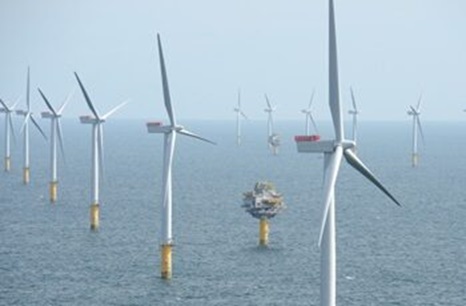
Trump keeps ‘Day One’ promise to squash offshore wind projects
President Donald Trump signed an executive order on Inauguration Day calling for the suspension of all offshore wind leases in federal waters of the Outer Continental Shelf for an indefinite period. The withdrawal reiterates Trump’s mantra, “Drill, baby, drill,” for oil and gas and demonstrates his preference for using fossil fuels, such as oil and gas, to address what he called the country’s national energy emergency. In the executive order, Trump cites demand for reliable energy, marine life, the fishing industry and costs for Americans as the reasons to temporarily withdraw energy leases, effective Jan. 21 and until he revokes the order. It also states there shall be no new offshore wind energy leases or renewals. more, >>CLICK TO READ<< 07:54
Proposed federal whale rule that would have devastated NC businesses has been withdrawn
 A federal rule proposed by the National Oceanic and Atmospheric Association (NOAA) that would have dealt a devastating blow to businesses and tourism along the East Coast from Massachusetts to Florida and including North Carolina, has been withdrawn by the National Marine Fisheries Service (NMFS). The North Atlantic Right Whale (NARW) Vessel Strike Reduction Rule, proposed by NOAA, would have restricted vessels greater than or equal to 35 feet (10.7 m) and less than 65 feet (19.8 m) in length to 10 knots (roughly 11 mph) along much of the Eastern Seaboard during the whales’ migration and calving season, from November to May. NMFS said it withdrew the proposed rule in light of numerous and ongoing requests from the public for further opportunities to review and engage with the NOAA on the proposal. more, >>CLICK TO READ<< 07:43
A federal rule proposed by the National Oceanic and Atmospheric Association (NOAA) that would have dealt a devastating blow to businesses and tourism along the East Coast from Massachusetts to Florida and including North Carolina, has been withdrawn by the National Marine Fisheries Service (NMFS). The North Atlantic Right Whale (NARW) Vessel Strike Reduction Rule, proposed by NOAA, would have restricted vessels greater than or equal to 35 feet (10.7 m) and less than 65 feet (19.8 m) in length to 10 knots (roughly 11 mph) along much of the Eastern Seaboard during the whales’ migration and calving season, from November to May. NMFS said it withdrew the proposed rule in light of numerous and ongoing requests from the public for further opportunities to review and engage with the NOAA on the proposal. more, >>CLICK TO READ<< 07:43
NOAA’s “no evidence” that wind kills whales violates the Information Quality Act
 NOAA persists in claiming there is no evidence that offshore wind development is causing whale deaths. This is a false claim that is repeated endlessly in the press. There is lots of evidence some of which I have documented over the last two years. It is actually illegal for Federal agencies to make false claims like this. There is a 25-year-old law called the Information Quality Act (IQA) enforced by OMB’s Office of Information and Regulatory Affairs. IQA mandates that agencies provide accurate unbiased information. Here are the two key definitions from NOAA’s IQA guidance,,, Unfortunately, NOAA’s repeated claim that there is no evidence of wind development causing whale deaths is neither accurate nor unbiased. It is false and typical of NOAA’s actions biased in favor of development. more, >>CLICK TO READ<< 09:48
NOAA persists in claiming there is no evidence that offshore wind development is causing whale deaths. This is a false claim that is repeated endlessly in the press. There is lots of evidence some of which I have documented over the last two years. It is actually illegal for Federal agencies to make false claims like this. There is a 25-year-old law called the Information Quality Act (IQA) enforced by OMB’s Office of Information and Regulatory Affairs. IQA mandates that agencies provide accurate unbiased information. Here are the two key definitions from NOAA’s IQA guidance,,, Unfortunately, NOAA’s repeated claim that there is no evidence of wind development causing whale deaths is neither accurate nor unbiased. It is false and typical of NOAA’s actions biased in favor of development. more, >>CLICK TO READ<< 09:48
Scientists set the record straight on rumors surrounding wind turbines: ‘I want to be unambiguous’
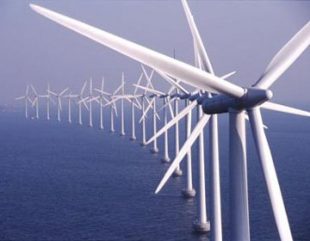 An Australian scientist is debunking some of the more absurd myths concerning wind turbines and their environmental impact, most notably around whales. An article in the Sydney Morning Herald broke down the claims that have been put forth in opposition to offshore wind turbine farms, which include suggestions turbines pose a danger to the lives of whales feeding, migrating, or spawning in the regions where the wind farms are being built. However, Dr. Olaf Meynecke, a research fellow at the Coastal and Marine Research Centre at Griffith University in Australia, was quick to point out these theories have no basis in fact. “The claims that are made by some members of the public or some politicians that it is going to kill whales are absolutely incorrect,” he said. Links, more, >>CLICK TO READ<< 10:16
An Australian scientist is debunking some of the more absurd myths concerning wind turbines and their environmental impact, most notably around whales. An article in the Sydney Morning Herald broke down the claims that have been put forth in opposition to offshore wind turbine farms, which include suggestions turbines pose a danger to the lives of whales feeding, migrating, or spawning in the regions where the wind farms are being built. However, Dr. Olaf Meynecke, a research fellow at the Coastal and Marine Research Centre at Griffith University in Australia, was quick to point out these theories have no basis in fact. “The claims that are made by some members of the public or some politicians that it is going to kill whales are absolutely incorrect,” he said. Links, more, >>CLICK TO READ<< 10:16
Humpback Whale Washes Up on Boston’s South Shore, Sparking Further Alarm Over Rising Whale Deaths
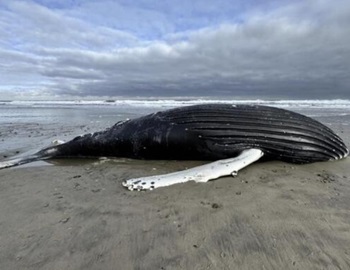 A young female humpback whale was found stranded and deceased on Rexhame Beach in Marshfield, MA the day after Christmas, raising concerns over a surge in whale deaths along the Atlantic coastline. The Christmas stranding marks the sixth large whale death in WDC’s response zone since July. This alarming streak began with a humpback whale carcass floating off the Massachusetts coast and continued with three minke whale strandings in August and September. December alone has seen two other young humpback whales stranded in the area. These strandings are part of a larger crisis. Since 2016, the National Oceanic and Atmospheric Administration (NOAA) has been investigating what it calls an “unusual mortality event” impacting humpbacks, minkes, and endangered right whales along the Atlantic coast from Maine to Florida. more, >>CLICK TO READ<< 08:52
A young female humpback whale was found stranded and deceased on Rexhame Beach in Marshfield, MA the day after Christmas, raising concerns over a surge in whale deaths along the Atlantic coastline. The Christmas stranding marks the sixth large whale death in WDC’s response zone since July. This alarming streak began with a humpback whale carcass floating off the Massachusetts coast and continued with three minke whale strandings in August and September. December alone has seen two other young humpback whales stranded in the area. These strandings are part of a larger crisis. Since 2016, the National Oceanic and Atmospheric Administration (NOAA) has been investigating what it calls an “unusual mortality event” impacting humpbacks, minkes, and endangered right whales along the Atlantic coast from Maine to Florida. more, >>CLICK TO READ<< 08:52
In the Pacific Northwest, killing sea lions is a necessity
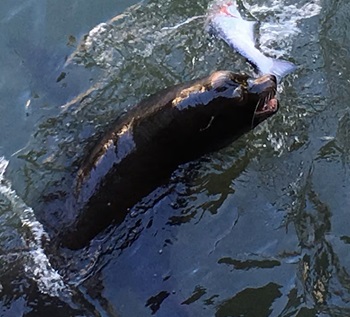 Don’t let their adorable faces and playful personalities fool you: California and Steller sea lions are capable of having disastrous impacts on nonnative ecosystems. In places like the Columbia River Gorge, these so-called dogs of the sea have been encroaching on native fish habitats for decades. Making homes in the Pacific, in coastal areas like the beaches of California, Alaska and Japan, these sea lions especially thrive on the West Coast, where population numbers are estimated to have grown from 75,000 to 257,000 in the last 30 years. This population boom has meant increased nutritional needs, sending thousands of sea lions inland in search of prey. One of the easiest targets for sea lions is the Columbia River, one of North America’s largest rivers and a key migration route for North American fish. The picturesque river valley abounds with seafood, including 13 federally protected species. more, >>CLICK TO READ<< 10:12
Don’t let their adorable faces and playful personalities fool you: California and Steller sea lions are capable of having disastrous impacts on nonnative ecosystems. In places like the Columbia River Gorge, these so-called dogs of the sea have been encroaching on native fish habitats for decades. Making homes in the Pacific, in coastal areas like the beaches of California, Alaska and Japan, these sea lions especially thrive on the West Coast, where population numbers are estimated to have grown from 75,000 to 257,000 in the last 30 years. This population boom has meant increased nutritional needs, sending thousands of sea lions inland in search of prey. One of the easiest targets for sea lions is the Columbia River, one of North America’s largest rivers and a key migration route for North American fish. The picturesque river valley abounds with seafood, including 13 federally protected species. more, >>CLICK TO READ<< 10:12
Endangered whales found entangled in fishing gear off Massachusetts coast
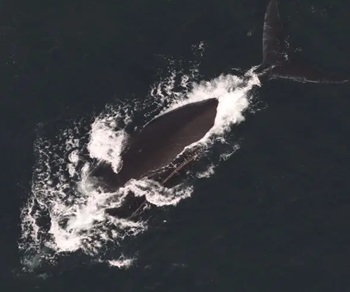 Two endangered whales have been discovered entangled in fishing line off the coast of Massachusetts, the National Oceanic and Atmospheric Administration announced Tuesday, as biologists warned one of the whales is “likely to die.” NOAA said the pair of North Atlantic right whales was found during an aerial survey on Dec. 9, approximately 50 miles southeast of Nantucket. NOAA Fisheries biologists said a juvenile male, #5110, has a thick line that passes across his head and once across his back, leaving him “seriously injured” and likely to die. NOAA said it is currently monitoring the federally protected whales and will determine “if entanglement responses will be possible.” Video, more, >>CLICK TO READ<< 08:11
Two endangered whales have been discovered entangled in fishing line off the coast of Massachusetts, the National Oceanic and Atmospheric Administration announced Tuesday, as biologists warned one of the whales is “likely to die.” NOAA said the pair of North Atlantic right whales was found during an aerial survey on Dec. 9, approximately 50 miles southeast of Nantucket. NOAA Fisheries biologists said a juvenile male, #5110, has a thick line that passes across his head and once across his back, leaving him “seriously injured” and likely to die. NOAA said it is currently monitoring the federally protected whales and will determine “if entanglement responses will be possible.” Video, more, >>CLICK TO READ<< 08:11
My Reason for Leaving Northeast Trawl Advisory Panel – Captain Sam Novello
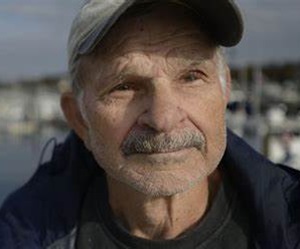 I was asked to join the NTAP (Northeast Trawl Advisory Panel) by NEFMC and I did because I believed could help, because I am quite knowledgeable about fishing and how to get fishing gear to fish properly. In the year 2000, I was on the spring survey of the R/V Albatross, and I was told by some of the crew who were x-commercial fishermen, that when the net was hauled you would not like the results. (so true) At that time, my vessel which was a side-trawler was using 60-80 net as the Albatross was using. My thoughts were, we have a catching problem here, on the Albatross. more, >>CLICK TO READ<< 06:37
I was asked to join the NTAP (Northeast Trawl Advisory Panel) by NEFMC and I did because I believed could help, because I am quite knowledgeable about fishing and how to get fishing gear to fish properly. In the year 2000, I was on the spring survey of the R/V Albatross, and I was told by some of the crew who were x-commercial fishermen, that when the net was hauled you would not like the results. (so true) At that time, my vessel which was a side-trawler was using 60-80 net as the Albatross was using. My thoughts were, we have a catching problem here, on the Albatross. more, >>CLICK TO READ<< 06:37






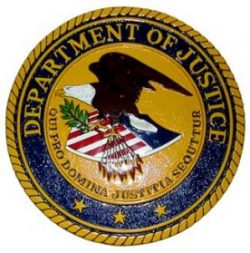 A Southeast Alaska commercial fisherman was sentenced today to six months in prison for falsifying fishing records in violation of the Lacey Act and illegally taking a sperm whale in violation of the Endangered Species Act. According to court documents, between October and November 2020, Dugan Paul Daniels, 55, of Coffman Cove, knowingly submitted false records about his commercial fishing activities to make it appear that he lawfully caught sablefish, aka “black cod,” in federal waters on two separate occasions. An investigation revealed he harvested the fish illegally in State of Alaska waters, specifically, in Chatham Strait and Clarence Strait, respectively. The total market value of the illegally harvested fish was $127,528.
A Southeast Alaska commercial fisherman was sentenced today to six months in prison for falsifying fishing records in violation of the Lacey Act and illegally taking a sperm whale in violation of the Endangered Species Act. According to court documents, between October and November 2020, Dugan Paul Daniels, 55, of Coffman Cove, knowingly submitted false records about his commercial fishing activities to make it appear that he lawfully caught sablefish, aka “black cod,” in federal waters on two separate occasions. An investigation revealed he harvested the fish illegally in State of Alaska waters, specifically, in Chatham Strait and Clarence Strait, respectively. The total market value of the illegally harvested fish was $127,528. 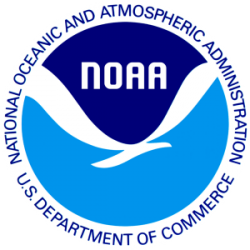 NOAA (National Oceanic and Atmospheric Administration) has been actively involved in Diversity, Equity, and Inclusion (DEI) initiatives, embracing them tightly during the last 4 years. This is the federal agency responsible for e federal agency for forecasting the weather, researching and analyzing climate data. and tracking storms. So, it is a little perplexing that the staff was distracted by social justice initiatives, rather than the meteorological science American expected them to focus on. Now the Department of Government Efficiency (DOGE), led by Elon Musk, has gained access to NOAA’s IT systems and is currently reviewing the agency’s DEI program after having been initially denied entry. Links,
NOAA (National Oceanic and Atmospheric Administration) has been actively involved in Diversity, Equity, and Inclusion (DEI) initiatives, embracing them tightly during the last 4 years. This is the federal agency responsible for e federal agency for forecasting the weather, researching and analyzing climate data. and tracking storms. So, it is a little perplexing that the staff was distracted by social justice initiatives, rather than the meteorological science American expected them to focus on. Now the Department of Government Efficiency (DOGE), led by Elon Musk, has gained access to NOAA’s IT systems and is currently reviewing the agency’s DEI program after having been initially denied entry. Links, 